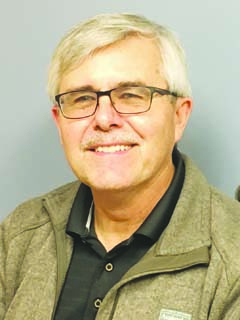By Loren Hardin-
This is part two of a series about Carolyn who was sixty-nine when she enrolled in outpatient Hospice services with Parkinson’s disease. Her husband, Charlie stated, “It all started about fifteen years ago with falling for no reason and having trouble picking up things.” Now Carolyn is seventy-two and Charlie is picking Carolyn up.
Charlie and Carolyn reflected on their forty-seven years of marriage. Carolyn stated, “Someone told me I needed to get with Charlie Caplinger but I told them, ‘There will have to come a thunderstorm with mud up to my ankles before I’d ever go out with Charlie Caplinger.‘” Charlie jumped in, “But that’s exactly what happened! I took her to the Adam’s County Fair and when we got there the sky was clear. But clouds started moving in and it rained two inches in twenty minutes. When we walked back to the car the mud was up to our ankles. I told Carolyn, ‘Honey, you better make sure your words are sweet because you might have to eat them.’”
Charlie admitted, “I didn’t know how to be a good husband but I had a good trainer.” Carolyn responded, “But It wasn’t easy!” Carolyn pressed the palms of her hands together and looked up towards heaven as if to say, “It’s a miracle! Thank you God!” Charlie shared, “But I have learned that one of the secrets of a long marriage is to ‘Kiss an angel good morning and love her like the devil when you get back home,’” (“Kiss an Angel Good Morning”, Charlie Pride, 1971). Charlie grinned like a possum and raised his eyebrows at Carolyn and she smiled back at Charlie. I’ll never be able to look at those two the same again.
Now to the story at hand; Charlie shared, “My step-dad worked in a metal plating factory in Cincinnati. A fellow he was working with was reaching into his back pocket to get a big chaw of tobacco and was starting to put it in his mouth. His gloves were wet and liquid cyanide was dripping off the fingers of his gloves. They used cyanide in one of the processes back then; and it only takes a small amount of cyanide to kill a person. Dad said he didn’t have time to tell him to stop so he smacked him. The fellow was mad at first but he got over his anger pretty quickly. He just wasn’t thinking.”
Charlie’s story reminds me of the series of Mennen Skin Bracer TV commercials in the early seventies. The slogan was, “If you need waking up, slap on some skin bracer…its skin tighteners and chin chillers will wake you up like a cold slap in the face.” The series was a montage of scenarios in which someone needed to be woke up. Every person, after being slapped in the face with a handful of skin bracer would respond, “Thanks, I needed that!” Charlie suggested, “That’s how it is with the truth. Sometimes you have to smack people with the truth to save their lives, for their own good.”
Charlie and I engaged in a lengthy discussion about how difficult it is to tell people the truth when they don’t want to hear it. Charlie suggested “Most people will listen to you if you approach them in the right way.” But after further discussion we agreed that some people won’t listen to you no matter how you approach them. After all, look what happened to Jesus.
Charlie went to a back room and returned with a spiral notebook of quotes he collected during his thirty years of preaching. He pointed out the following quote by Harriet Beecher Stowe, ““The truth is the kindest thing we can give folks in the end.” Harriet Beecher Stowe knew what it was like to tell people the truth when they didn’t want to hear it. She wrote, “Uncle Tom’s Cabin”, in 1852, an admonition against slavery that encountered wide spread resistance in the south. She supported the Underground Railroad in Cincinnati and housed several fugitive slaves in her own home.
Now to us who would say, “It’s none of my business”, “I don’t want to get involved”; God has a word or two for us, “…if the watchman sees the sword coming and does not blow the trumpet and the people are not warned, and the sword comes and takes away any person…his blood I will require at the watchman’s hand” (Ezekiel 33:6) You see, In God’s eyes, we are our “brother’s keeper”. (Genesis 4:9) If we see someone on a collision course and don’t warn them, in God’s eyes, it’s on our hands. And who knows, perhaps when we warn them they will even respond, “Thanks, I needed that”, or perhaps not; but it really makes no difference.
Loren Hardin is a social worker with SOMC-Hospice and can be reached at 740-357-6091 or at lorenhardin53@gmail.com. You can order Loren’s book, “Straight Paths: Insights for living from those who have finished the course”, at Amazon and Barnes and Noble.





